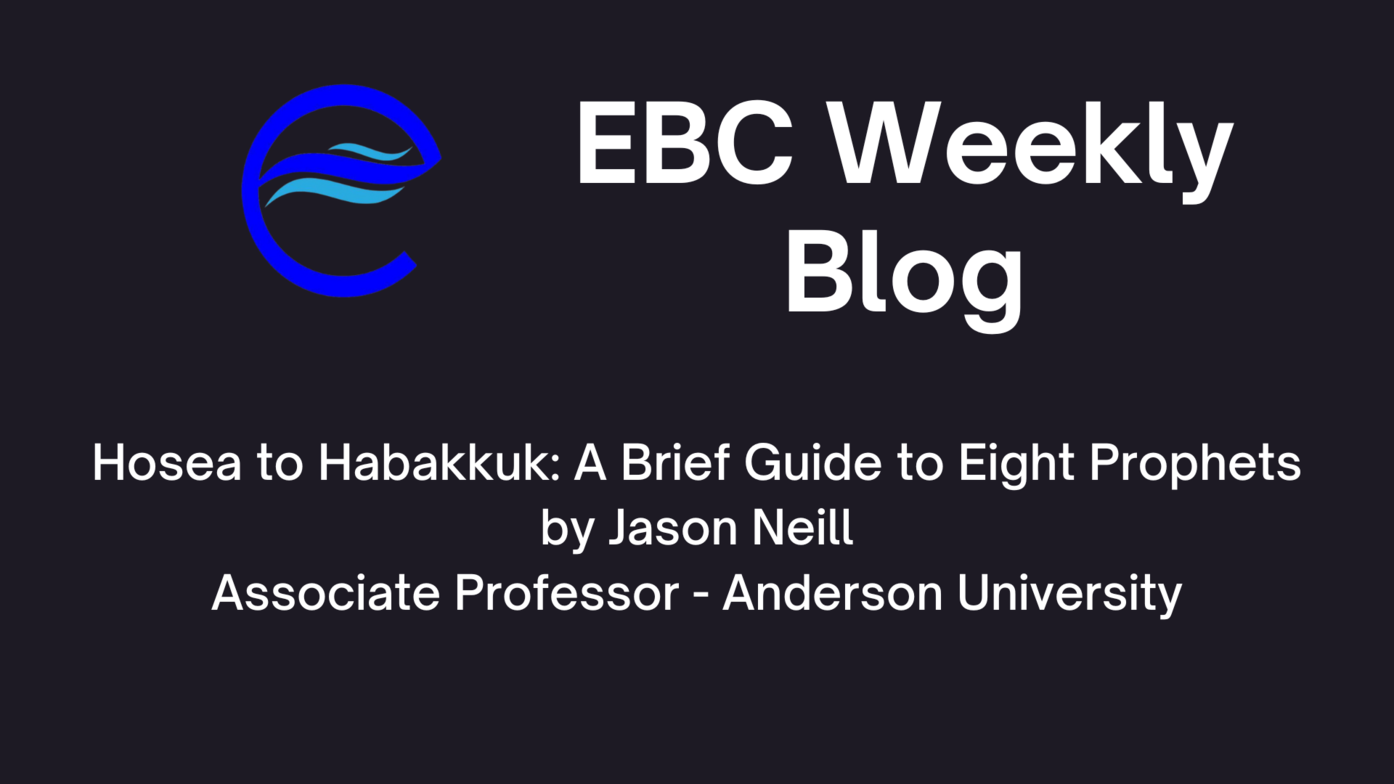Hosea to Habakkuk: A Brief Guide to Eight Prophets


September 15, 2025
Hosea to Habakkuk: A Brief Guide to Eight Prophets
by Jason Neill
Scripture reading: Hosea - Habakkuk
This week’s Bible reading plan provides me with a monumental feat. To keep up with
our reading for the year, I am going to briefly cover eight prophetic books. Let’s dive
right in.
Hosea (755 – 710 B.C.) preached to the Northern Kingdom, known as Israel. The theme
of this book is God’s love for Israel. The prophet Hosea was told by God to marry a
promiscuous woman. The New Living Translation reads, “When the LORD first began
speaking to Israel through Hosea, he said to him, ‘Go and marry a prostitute, so that
some of her children will be conceived in prostitution. This will illustrate how Israel has
acted like a prostitute by turning against the LORD and worshiping other gods’” (1:2).
Israel had turned away from God and embraced the worship of idols. Hosea called the
Northern Kingdom back to covenantal faithfulness, but they refused. In 722 B.C., they
were invaded by Assyria and taken captive.
Joel (835 B.C.) preached to the Southern Kingdom, known as Judah. The theme of this
book is “The Day of the Lord” (see Joel 1:15; 2:1, 11, 31; 3:14). The day of the LORD
was not a literal 24-hour day, but a means of expressing a period of judgment that was
coming. The agricultural resources of the nation were devastated by a plague of locusts.
Joel used this imagery to communicate that another army is coming to devastate the
nation if it does not repent. The Southern Kingdom experienced its ups and downs of
good kings with bad kings. Tragically, Judah is invaded by the Babylonians three
different times with the last date marking the destruction of Solomon’s Temple (i.e. 605
B.C, 597 B.C., 586 B.C.).
Amos (760 – 753 B.C.) preached to the Northern Kingdom, Israel. He ministered in the
city of Bethel which was one of the centers of idol worship. The theme of this book is
judgment. Amos is a great example of God using an “average Joe” to carry out his will.
He was a shepherd and cultivated fruit from the sycamore tree (see Amos 1:1; 7:14-15).
The Northern Kingdom was at the height of wealth and affluence, yet it worshiped other
gods and neglected the poor.
Obadiah (840 B.C.) preached to the nation of Edom (descendants of Esau, Jacob’s
brother). The theme of this book is just deserts. Since Israel and Edom were related,
they should have looked out for one another; however, Edom despised Israel. So, when
their enemies were fighting Israel, and winning, they joined in to help Israel’s enemies.
As a result, God tells Edom it is time to face the consequences of their sin.
Jonah (760 B.C.) preached to the pagan nation of Assyria. The theme of this book is
God’s grace, especially to those outside the believing nation of Israel. The capital of
Assyria was Nineveh, where God told Jonah to preach a message of repentance. He so
hated the Assyrians that he refused to go and headed in the opposite direction. Through
a series of events, God brought him right to the doorstep of Assyria. After Jonah’s
preaching, they repented, which only ticked off Jonah more. The book ends with a
question God asked Jonah. “Nineveh has more than 120,000 people living in spiritual
darkness, not to mention all the animals. Shouldn’t I feel sorry for such a great city?”
(see Jonah 4:11, NLT).
Micah (735 – 710 B.C.) preached to the Southern Kingdom, Judah. The theme of this
book is personal righteousness. The religious leaders and false prophets were
preoccupied with oppressing and exploiting others for personal gain. Micah 3:9-12
provides a glimpse of how low Judah had become.
“Listen to me, you leaders of Israel! You hate justice and twist all that is right. You are
building Jerusalem on a foundation of murder and corruption. You rulers make decisions
based on bribes; you priests teach God’s laws only for a price; you prophets won’t
prophesy unless you are paid. Yet all of you claim to depend on the LORD. “No harm
can come to us,” you say, “for the LORD is here among us.” Because of you, Mount
Zion will be plowed like an open field; Jerusalem will be reduced to ruins! A thicket will
grow on the heights where the Temple now stands” (NLT).
Nahum (660 B.C.) preached to Assyria. One hundred years earlier, Nineveh repented
(see the book of Jonah); however, they lapsed back into sin. The theme of this book is
judgment. “The LORD is a jealous God, filled with vengeance and rage. He takes
revenge on his enemies; he is furious with his foes. The LORD is slow to get angry, but
his power is great, and he takes revenge on his enemies. He will not let the guilty go
unpunished. He displays his power in the whirlwind and the storm. The clouds are the
dust beneath his feet” (see Nahum 1:2-3, NLT).
Habakkuk (607 B.C.) preached to the Southern Kingdom, Judah. The theme of the book
is trusting God. This is one of my favorite Old Testament prophets. He has a
conversation with God, and we get to listen in. Habakkuk notices all the evil and
corruption around him and prays that God would do something about it. God replies he
is going to send Babylon, a more wicked nation than Judah, to exact judgment on the
nation. Naturally, Habakkuk asks why. God in essence tells him, trust me.
Well, there you have it. A quick flyby over eight prophetic books. Although our flight was
fast, I hope you’ll take time to ponder the importance of these precious books.